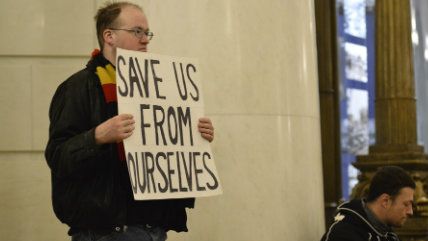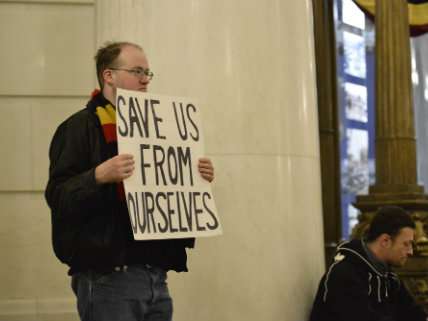Trump Versus the Bureaucracy
The civilian bureaucracy voted overwhelmingly against Donald Trump. These people can make a lot of trouble for the next president in a lot of ways.


There are a lot of hot battles to watch out for in 2017. President Trump versus Congress. President Trump versus the press. President Trump versus the Democrats. President Trump versus the Chinese, Mexico, Iran, and the Islamic State. But one of the potentially most explosive of all will be Trump versus the bureaucracy.
The executive branch civilian workforce numbers about 2.7 million; the uniformed military are another 1.5 million. Against that more or less permanent federal workforce of roughly 4 million people, President Trump gets to fill maybe 4,000 jobs. For the math geniuses out there, that's roughly one Trump representative for every 1,000 federal employees. Another way to put it is that the presidential election changes not 1 percent, but one tenth of one percent of the federal workforce. And it will be six months to a year before even those political appointees are fully vetted, confirmed, cleared, and in place, maybe longer until they figure out what is going on.
Theoretically, at least, the president and his cabinet secretaries and top White House staffers are "in charge." But any teacher who has tried to control a classroom of 20 children, any parent who has tried to get three children dressed and out the door in time for school, any business manager who has tried to get their direct reports to do anything knows that it's hard enough to get even a small group of people to move in one direction.
The military may be used to taking orders. And the civilian bureaucracy may understand, in some civics class sort of way, that its job is to serve the president in implementing the laws made by Congress. Lots of these federal offices have little framed portraits of the president of the United States on the wall somewhere. Those pictures do get changed every four years or so.
But even so, it's a very thin layer of authority. It's a point that's been stressed to me emphatically and repeatedly by people who have served as political appointees in government.
A lecturer at Harvard's Kennedy School of Government, Robert Behn, writes abut this as "the law of diminishing control: the larger any organization becomes, the weaker is the control over its actions exercised by those at the top." He says bureaucrats speak of "residents" and "tourists"— the residents are the bureaucrats; the tourists are political appointees, just passing through. Or, Behn writes, a member of the permanent government refers to himself or herself as a "We Be" — as in, "We be here before you're here. We be here after you're here."
The civilian bureaucracy, after all, voted overwhelmingly against Trump. The District of Columbia voted 91 percent for Hillary Clinton. Washington's Virginia suburbs, where federal workers live, voted for her, too: she won 77 percent of the vote in Arlington County and 65 percentof the vote in Fairfax County. In Montgomery County, Maryland, another Washington suburb full of federal employees, 76 percent of the vote went to Clinton. In Prince George's County, Maryland, another Washington suburb full of federal employees, the presidential vote was 89 percent for Clinton.
These people can make a lot of trouble for Trump in a lot of ways.
They can leak to the press. It's not a coincidence that The New York Times is suddenly running full-page ads promoting its acceptance of confidential news leaks. These ads did not appear immediately after President Obama was elected.
The bureaucrats can just work more slowly. That's not a full-fledged strike like the air traffic controllers during the Reagan administration, but more, instead, appearing to work while quietly doing whatever is possible to undercut the administration's policy initiatives.
They can try to capture their political appointees by explaining, in great sophisticated detail, why Trump's policies would never work, and why the political appointees would be much better off instead continuing the policies of the previous administration.
If the Trump appointees get fed up with any of that and attempt to fire the bureaucrats, good luck to them. It's not The Apprentice, where Trump could say "you're fired." Civil service protections, "whistleblower" rules, union grievance procedures, and anti-discrimination laws mean that in government, such clashes are often time-consuming and more trouble than they are worth.
That's all one perspective from which to view the claims that Trump's choices for top jobs are somehow extreme or radical. They'd better be, because the forces of inertia are so strong in Washington that to change or improve anything at all, someone has to come in with an aggressive agenda and a lot of energy.


Show Comments (53)